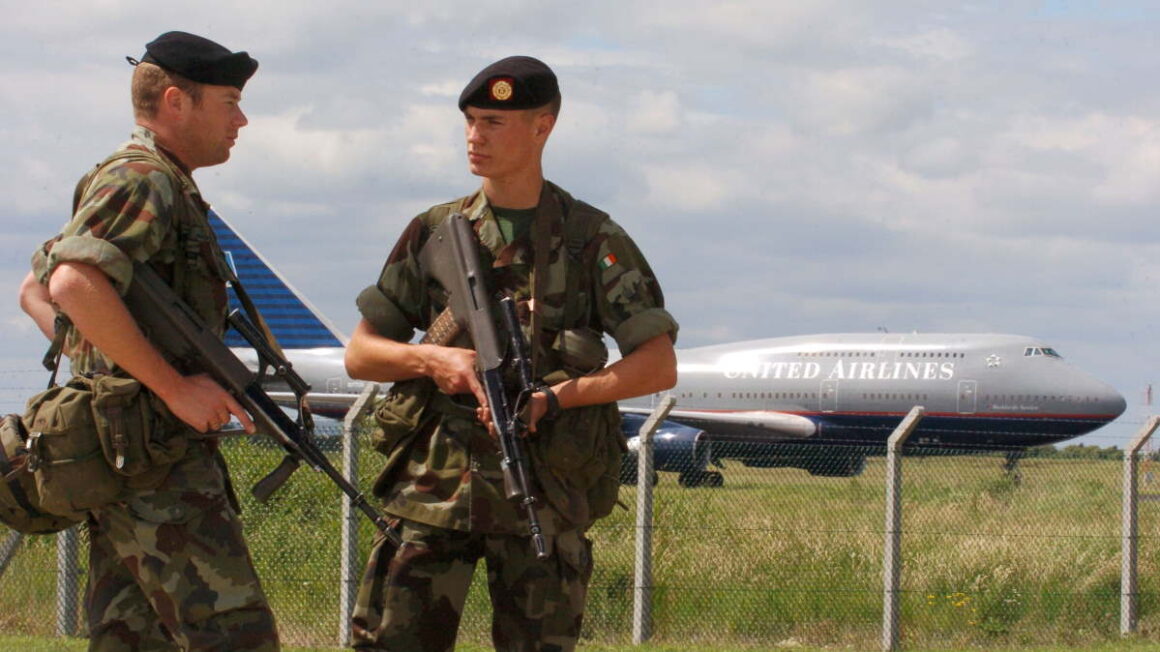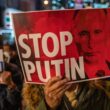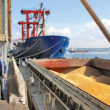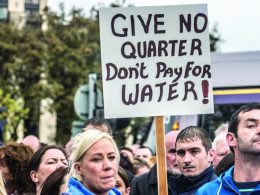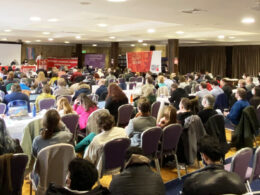Text of speech given by Socialist Party TD Mick Barry in the Dáil on 30 March 2022.
I will begin my contribution with a personal reminiscence. I remember a crowd of kids standing out on the sidewalk, as we used to say, on the street corner in Columbus, Ohio. I think the year was probably 1970, which would place me at age six or seven. There was a big conversation and it was all about the so-called crazy kid who lived around the corner. We were convinced this teenager was crazy because he had decided to go for a little walk right off the roof of his mother’s garage. Inevitably, he broke his legs, so as far as we were concerned he was “crazy”. Of course he was not, because in doing so he escaped the draft, avoided Vietnam, possibly saved his own life and he probably saved the lives of others. It was only years later I realised what was going on and that maybe to be crazy in a crazy world makes a person one of the sanest of the sane.
Since then I have read many history books and I have studied a few wars, including that particular war in which 58,000 US soldiers died and in which three million Vietnamese people died. That reading, study and maybe a few childhood experiences such as that – it was not the only one – brings me to a point in this Dáil where I approach this discussion as a socialist opponent of imperialist war and militarism and as a person who casts a very sceptical eye on the pronouncements and propaganda of capitalist spokespersons on these issues.
Irish state has never been neutral
The Irish State has never been a genuinely neutral State. It was neutral in the Second World War, and maybe more so than some other wars, but on the side of America and Britain. It was neutral in the Vietnam war on the side of Uncle Sam. It was so neutral in the Iraq war that Shannon Airport was given over as a refuelling pit stop for the American war machine.
This State came into being on the back of a counter-revolution that overpowered a revolution which had been driven by the working class and the poor for both national and social liberation. The revolutionary movement of 1917 to 1923 was so powerful that the leaders of the new State felt they had to tip the hat to its most dearly held sentiments. Clearly, a mass movement that had challenged the power of an empire had created a strong anti-imperialist sentiment in the country. Hence the official policy of the leaders of the new State was neutrality with no overt connections with imperialist power blocs, but unofficially it was to give as much political and, where possible, practical support to such blocs. Such has been the hypocrisy of Fianna Fáil, Fine Gael and the Irish capitalist class down through the decades that only now, with the Russian invasion, do they dare to lower the mask and reveal their real ambitions more fully.
A socialist foreign policy
Socialists are not neutral on issues of foreign policy either. In the battle between the black South African masses and apartheid capitalism, they were unequivocally on the side of those masses. In the struggle between the Iraqi people and the US invaders, who were gifted Shannon, our sympathies were on the side not of some of the factions but of the Iraqi people themselves. Similarly, in the struggle between the people of Ukraine and Putin’s invading army we stand 100% on the side of the Ukrainian people, support their right to armed self-defence and resistance, and call for the immediate withdrawal of all Russian troops.
As a socialist I support this Bill because it seeks to tie the hands of capitalist governments in the State, to restrict their ability to make military alliances, and to restrict their ability to declare war, allowing this only in circumstances where the country has been invaded and only then by way of a decision of Dáil Éireann. I also support it because it asks for ratification of that position by way of referendum, placing the decision in the hands of the people rather than those who want to strengthen Ireland’s military muscle whether they be in the Cabinet or the editorial rooms of the capitalist press.
A European Army
What would a European army or rapid reaction force look like? You might get a glimpse of this if you looked at what is happening today in Africa. A leaked document from the European Union-African Union Summit earlier this year stated the EU wants to scale up its military presence in Africa. The document describes Europe’s existing military deployments in Africa as stretching from the Sahel to the Gulf of Guinea, and from the Horn of Africa to the Mozambique canal, which echoes 19th century imperialist talk. The EUobserver states the EU currently has 11 military and naval missions in Africa. Many of these missions are led by France in west Africa, which is where France was formerly the direct colonial power. All of them serve to prop up pro-EU governments as the EU battles for influence on the continent with the rival imperialisms of China and Russia. The aim of the exercise is not so much to protect democracy. It is to protect sources of cheap minerals and cheap labour.
Many of the European capitalist states, such as France, Germany, Italy and Belgium, used to be colonial rulers in Africa and, collectively, have the blood of millions of people on their hands. That is an historical fact, Minister. On the question of peace, stopping war and today, the key to stopping war and ending the rule of autocrats lies with people power and, more specifically, with workers’ power. The Vietnam war, which I spoke of at the outset, was defeated by a pincer movement with key resistance by the Vietnamese people and the US anti-war movement. The Stalinist dictatorships of eastern Europe were toppled not by NATO tanks but by people power. The beginning of the end of the First World War was protests and strikes by Russian workers on the streets, which toppled a Tsar and went on to defeat capitalism. The key to defeating Putin’s war lies with the resistance of the Ukrainian people and the actions of the Russian anti-war movement itself. By the way, the more NATO is involved, the more Putin is strengthened at home, as seen with the comments regarding regime change that were made by Biden in Poland at the weekend.
Increasing military expenditure
I want to say a word about those, including the Minister, who want to increase military spending in this country. I want to see more spending on pay and conditions for Defence Forces members. We defend the interests of Defence Forces members, despite the comments of the Minister earlier.
I want this country to be secure from cyberattacks. There is a certain hypocrisy in Fine Gael Ministers highlighting the issue of cybersecurity when Fine Gael’s underfunding of the HSE’s security system for years and years left it open not just to attack but to being crippled last year. If more money is needed to defend the likes of the HSE’s computer system, that is no problem.
Nevertheless, I am totally opposed to massive increases in spending on arms and the weapons of war. The PESCO target of spending 2% of GDP on military would bring Irish military spending to €3.6 billion. The Minister does not support that position at this point, but he might think about what we could do with €3.6 billion. Let us look at the cost-of-living crisis and the rising prices of oil, food and fuel. A total of 70% of Irish households could be given a cheque for €1,000 each to offset those fuel and food price increases. That is how we will fight this campaign, namely, with class politics. We will make the point we need money for our nurses, our health system and housing, not to be spending on arms.
The Minister stated there is a good chance Ireland will be involved in the rapid reaction force. There is no chance of that without major opposition in society because it is not the sons and daughters of Ministers who will be sent to risk their lives. It will be sons and daughters who come from working class homes, as has always been the case.





